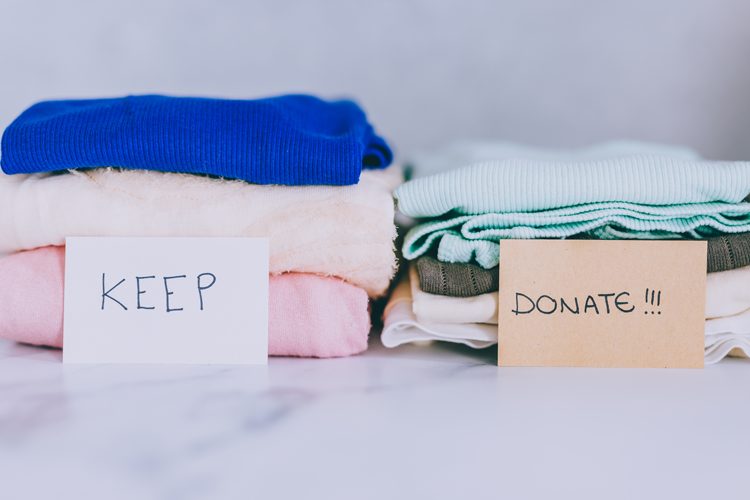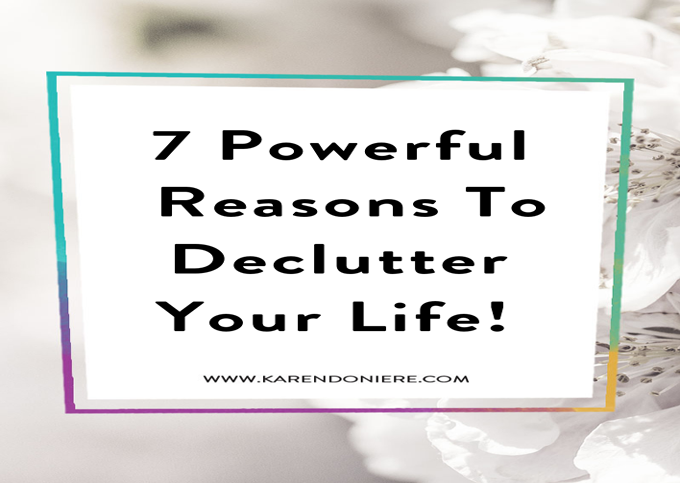
In the busy world that we live in today, our private homes should be a safe haven from the outside world. But, when each room is filled with too much stuff, they can easily become anxiety-inducing, cluttered traps.
The easy solution is to learn how to declutter. Did you know that decluttering your immediate surroundings can have a positive affect on your mental health?
But first, what is clutter? Merriam Webster’s dictionary defines clutter as “a means to fill or cover with scattered or disordered things that impede movement or reduce effectiveness.”
Recently, studies have shown that increased clutter affects our mental health and general well-being.
In order to enjoy improved mental and emotional health, decreased anxiety, and less frustration and guilt, here are seven powerful reasons to declutter your life!
1. Too much clutter increases your anxiety. Clutter makes you anxious because it overwhelms you, and makes you feel out of control. We may want to regain control of the excess clutter in our lives, but don’t know how. In the end, we may feel anxious, helpless, or alone.
For example, if my guest room is filled with stuff, and I can’t freely move around or quickly find anything, I probably have too much stuff, and the idea of managing it creates anxiety.
2. Too much clutter is a distraction. Clutter subtly distracts you by taking your attention away from the things you should be focused on. Those distractions keep you moving within a circle of nonproductive activity.
For example, if you can’t focus on completing specific tasks because your surroundings are too cluttered, you have too much stuff.
When I feel like I’m going in unproductive circles, I check my area to see if it’s messy. I can’t work in clutter and chaos because I can’t think clearly or make any real progress on my goals. Then, once I put things in their proper place, I’m okay.

3. Too much clutter makes you feel ashamed or guilty. Are you ashamed when guests visit? Or, do feel guilty about not having enough time to organize everything? Having too much clutter creates unnecessary feelings of shame and guilt because you want to do things differently. We feel ashamed because our clutter might reveal to others that we don’t have control in certain aspects of our lives.
4. Too much clutter creates a sense of frustration. Being around clutter can be frustrating. It’s likely that you won’t be able to find important things you need to live such as car and house keys, necessary files, and medicine because they’re lost within the clutter. Additionally, this kind of clutter is an obstacle to the fulfillment of important daily tasks.
5. Too much clutter negatively affects your mental health. When your home is not a place of comfort and joy, and it makes you feel sad or depressed, excess clutter has started to affect your mental and emotional health. And, you should seek help from a professional.
6. Too much clutter encourages unhealthy eating habits. In an environment that’s cluttered and disorganized, research shows that we tend to eat more unhealthy snacks.
Within one study conducted by Dr. L. R. Vartanian, participants were placed in two environments: one chaotic, cluttered environment, and one organized environment. Those placed in the stressful, chaotic environment ate nearly twice as many cookies as those who were placed in the organized environment.
7. Too much clutter is terrible for your allergies. Dust mites, pet dander, and certain types of mold and bugs can thrive behind and underneath an unorganized collection of things. And, this can be harmful to those with allergies and asthma.
What can you do if you want to declutter your life but don’t know where to start? Here are five simple steps to get started today:
 1. Make a firm decision to declutter and stick to it. Also, remember to start small. Then, tell at least two people that you’re going to declutter so they can hold you accountable.
1. Make a firm decision to declutter and stick to it. Also, remember to start small. Then, tell at least two people that you’re going to declutter so they can hold you accountable.
Tidying expert and bestselling author, Marie Kondo says “you should make a firm commitment to tidying up.”
2. Plan to declutter in phases. Pick the same day each week and set a timer to organize things. Set your time for 15 – 30 minutes. Or, you can do a little every day so that it’s not too overwhelming for you.
3. Create to-go boxes and bags. Do not keep things that you haven’t used within the past six months to a year. Place things that need to get recycled, donated, and shredded, or trashed in the proper box or bag. And then, allow yourself to feel amazing for recycling!
In her six basic rules for tidying, Marie Kondo also says that “before you keep anything you should ask if it makes you joyful. If not, you should thank it for its service and let it go.”
4. Make it fun. Put on your favorite music playlist while you declutter, and the time will pass faster. You’ll also likely accomplish more because you’ll be having fun.
5. Open your mail immediately so that it doesn’t pile up. Place junk mail in a shred or recycle box.
Creating a home that’s an attractive and functional safe haven is an amazing feat. And, although the clutter blitz doesn’t happen overnight, you can conquer the challenges associated with decluttering, and eliminate the stress and anxiety associated with them. The benefits are well worth the effort.
If you or someone you know wants help for mental health issues, please visit NAMI at the National Alliance on Mental Illness, or call 1-800-950-6264.
References:
Carter, S. B. (2012). Why Mess Causes Stress: 8 Reasons, 8 Remedies. The mental cost of clutter. Psychology Today. https://bit.ly/2HKH6YC
Kondo, M. (2019). What is the KonMari Method?https://konmari.com/pages/about
Vartanian, L. R., Kernan, K. M., & Wansink, B. (2017). Clutter, chaos, and overconsumption: The role of mind-set in stressful and chaotic food environments. Environment and Behavior, 49(2), 215-223. doi:10.1177/0013916516628178

